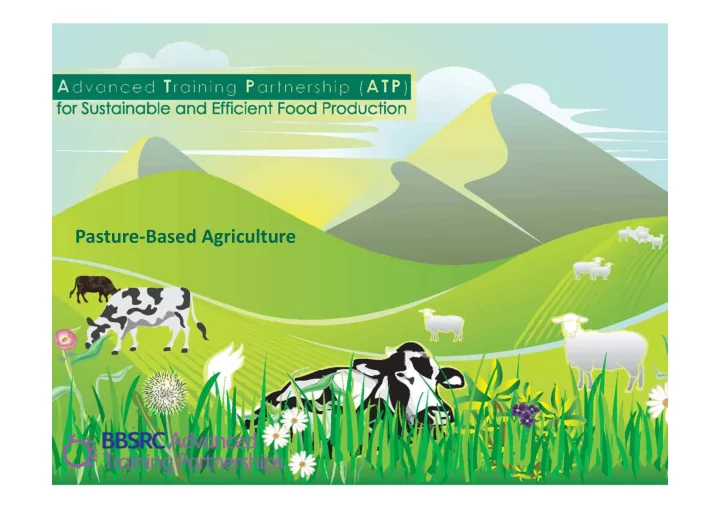

Pasture-Based Agriculture
What are ATPs? • Training programmes providing specialist scientific skills for the UK’s agri-food sector • Four in UK funded by • Movement of expertise and skills between the Research Needs research base and the New Knowledge agri-food Industry.
Partners Expertise Sustainable Beef, Sheep Sustainable Beef, Sheep and Dairy and Dairy Optimising Optimising Forage and Forage and Landuse Landuse Feed Feed Management Management Complementary Complementary & Wider Issues & Wider Issues
Target Audience Pasture-Based Agriculture • Large diverse sector • Poor history of innovation uptake Professionals regularly giving technical advice to farmers – e.g. • Supply chains attached to large retailers • Agricultural suppliers’ technical teams • Vets • Advisors for agri-environmental schemes • Farmers and Farm managers
Flexible Learning Structure CPD points CPD points Workshop Workshop (BASIS or BSAS) (BASIS or BSAS) + Distance Distance WHOLE WHOLE Exit with Exit with = Learning Learning MODULE MODULE 20 Postgraduate Credits 20 Postgraduate Credits x3 Complete 3 WHOLE MODULES Complete 3 WHOLE MODULES POSTGRADUATE POSTGRADUATE to gain 60 credits to gain 60 credits CERTIFICATE CERTIFICATE x6 Complete 6 WHOLE MODULES to gain 120 credits Complete 6 WHOLE MODULES to gain 120 credits Dissertation Dissertation + = MSc MSc and achieve POSTGRADUATE DIPLOMA and achieve POSTGRADUATE DIPLOMA (60 credits) (60 credits) Up to 5 years Up to 5 years
Subjects Covered This Year Sustainable Grassland Carbon Footprinting Systems & Lifecycle Assessment Ruminant Nutrition Upland Farming Systems Improved Silage Improving Animal Production Soil Management Improved Forages & Feeds Ruminant Gut Microbiology
Rolling Programme
Workshops • 2 days • Central or relevant • locations • Site visit • Big name speaker • Overview of issues • Emerging research • Discussion • CPD points (BASIS, DairyPro, BSAS)
Example Workshop: Ruminant Nutrition Day 1- Principles of Rationing: • Prof Jamie Newbold - how the rumen functions and pathways through it • Dr Mike Rose – measuring feed values and formulating rations Site visit - Frank Write Trou feed analysis lab Day 2 - What’s New in Ruminant Nutrition Research? • Prof Liam A. Sinclair Harper Adams University • Prof Nigel Scollan: fatty acid metabolism • Prof Jamie Newbold: feeding to reduce environmental impacts • Facilitated discussion: manipulating diet to meet consumer and environmental demands
Distance Learning • Guided learning peppered with research case studies • reading, videos, podcasts, mobile devices, forums, group and individual assignments. • No exams • 20 postgrad credits • 13 weeks • Max 15 hrs per week work
Example of Distance Learning Module Sustainable Grassland Systems
Overview Unit Description Distance Learning for Beginners 0 10% Multiple choice quiz 1 Range and distribution of grasslands Characteristics of forage species 2 Grassland composition 3 15% Short answer quiz 4 Managing pests and diseases in a changing environment Soil quality and low input systems 5 Grazing 6 4 critical abstracts: The influence of management and environment on pasture composition and forage cropping programmes 25% (500 words each) 7 Forage breeding Forage Preservation and bio-refining 8 A trade-style review article (e.g. Farmers Weekly) on the potential of either: new forage varieties; or grass biorefining 25% (1000 words) Animal Nutrition 9 Grassland Systems 10 25% Electronic workbook based on nutrient requirements and pasture supply for grazing cattle and/or sheep.
(3) Grassland Composition • Overview of grassland composition • Reseeding Pasture Research Case Studies: 1. Can certain mixtures of species maintain yield and quality whilst reducing inputs? - Dr Rosemary Collins 2. Do the lays used currently provide an optimum system? - Dr John Warren
(5) Soil Quality and Low Input Systems Assessment of soil quality Research Case Studies : - PROSOIL Healthy Soil-Healthy Grass-Healthy Livestock - NIAB’s low input trails
(6) Grazing Grazing options and their rationale Research Case Studies : - Pre-tupping grazing in sheep - Forages trial Dr Christina Marley Grassland Development Centre – Research behind FarmGraze App
Responsive Development Summary of Research Needs Training Needs Delivery Delivery Industry Industry ATP ATP Partners Partners Partners Partners Menu of potential New Knowledge training areas
Participation So Far Engagement Since October 2013 Workshop 8 Distance Learning 7 6 No. Trainees 5 4 3 2 1 0 Grassland Carbon Ruminant Upland Systems Footprinting Nutrition Farming
Participation So Far Sector Represented 1 Lecturer 2 Vets 6 Farmers 7 Tech Sales 13 Consultant /advisors
Fees and Bursaries Fees UK Fees UK Fees with Bursaries* Workshop Only £580 £116 Whole Module £1,200 £240 (Workshop & Distance Learning) BBSRC Bursaries* Available to: •Graduates – or equivalent •Currently employed fulltime in the UK agri-food industry Publically funded posts are ineligible for bursaries
NEXT Workshops: Improved Feed and Forage 27 th and 28 th June– IBERS Aberystwyth New developments in forage and feed crops bred for both animal production and environmental gains drastically improve the viability of domestically sourced feed and forages. • What are the domestic alternatives for a complete feed ration? • What traits are plant breeders breeding for? • What impact can using new varieties have on feed quality and cost? Alan Lovatt, Sandy Cowen, David Lloyd, Heather McCalman - IBERS Dr Philip Murray—Rothamsted Research Dr Simon Kerr - NIAB
Supporting the Pasture ATP • Feedback and suggestions for training development • Promoting our training • Considering bursary applications
Thank You
Recommend
More recommend